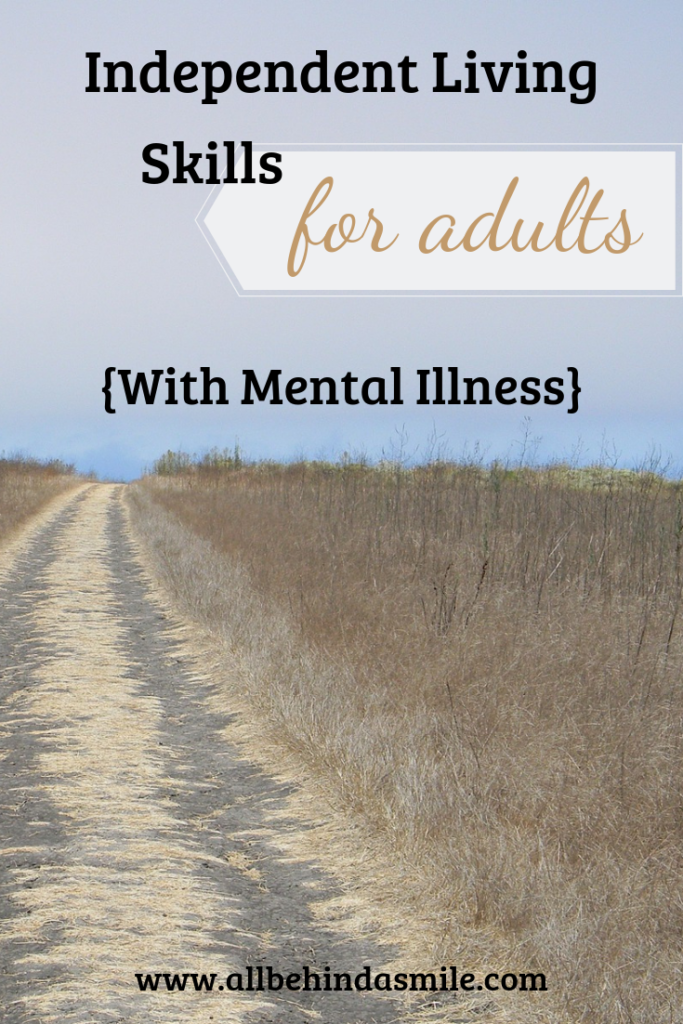As an adult with mental illness, independent living is hard. Often people with severe mental illness end up institutionalized, living with family/friends, or homeless. That’s why we are going to discuss a few independent living skills for adults.

I have never lived on my own.
I lived with my parents until I was twenty-one. That is the year I was institutionalized, and considered institution-homeless. At twenty-two I was married. At this point, you are probably wondering what I could possibly offer on the subject of independent living skills for adults.
Well, after twenty-six years of life, being institutionalized for a year and having been married for nearly four years, I’ve learned a tip or two about staying out of the hospital, remaining stable (I’ve been consistently stable for almost four years) and keeping a roof over my head.
Tips on Independent Living (for Adults):
- Have a source of income (not your parents!)
- Even with especially generous parents, they won’t be around forever. The same goes for a spouse – if something happens to them, you don’t want to be up a creek without a paddle. I am a housewife (there’s nothing wrong with that!) but please have a financial back-up plan just in case.
- Budget wisely
- No matter how much money you or your spouse makes, it won’t be enough if it isn’t spent wisely.
- Take any medicine you are prescribed, as prescribed
- Medicines are prescribed for a reason. Even if you think you are better, please consult your doctor before making any important decisions regarding medications.
- Make sure to have regularly scheduled appointments with your psychiatrist or health professional
- This one is important regardless of if you take medications – being mentally ill means you need an unbiased opinion on your mental health – someone other than yourself!
- Have at least one relationship with a friend or family member that you can trust and discuss symptoms openly with
- This goes back to needing an unbiased opinion on your mental health – this could be a spouse or a friend or even a family member.
Less Common Tips:
- Push yourself, but not too hard
- Only doing the same things day after day is not only boring, it can be hard on your mental health. It could even cause you to get worse – so push yourself out of your comfort zone, at least occasionally.
- Set (measurable) goals for yourself
- Going along with “push yourself”, this can help you get out of your comfort zone as well as feel better about yourself and your accomplishments.
- Keep a schedule or routine
- A schedule or routine doesn’t have to be traditional. (Mine is simply a to-do list for each day in a planner). However, having either a schedule or routine can help you accomplish your goals, and keep your mind off your symptoms.
- Exercise regularly
- This could be as simple as going for a walk or pacing the house!
- Get out of the house regularly
- A change of environment can be very beneficial to mental health, especially if dealing with depression. It can also be motivation for basic self-care, like showering.
Defining Independence:
Please keep in mind that everyone’s definition of “independent” will be slightly different. What really matters is the independence you want for yourself. If living on your own isn’t important to you, but having the money to support yourself is, then that’s what matters. Don’t let anyone tell you that marriage, or having a roommate, or whatever it may be isn’t a form of independence.
Wherever You Are:
The steps to independent living you take may be small, but someday you will look back and see how far you’ve come. It may be that you haven’t been hospitalized in a certain amount of time, or that you’ve kept a roof over your head … whatever it may be, you are getting there!
If you happen to already be there, that is fabulous! Keep up the amazing work and remember that you can always set new/more goals and grow your achievements.
Wherever you happen to be with independent living skills, you’ve got this! It will take time, and effort, but you can do this – don’t let anyone tell you otherwise.

Christian, wife, “hybrid” mama, I run the site All Behind A Smile to help others like me.


David Glen Sheets says
I had an antagonistic brother and sister to deal with when growing up which led toward me being medicated. I was made to take cogentin, trilofon, and respiridol before I was put on a medication that worked for me. My sister got me in trouble for fun and my brother was high strung. Such as, when I was a newborn, my mother told me years later, he would slap me to make me cry and divert her attention from cleaning the dishes.When she caught him and punished him, he tried to push me into traffic when I was 2 years old. Things are better for me now, but I had a rocky start and I’ve been told to avoid my brother completely after what he did. He’s my brother, so it’s hard to see him as dangerous after all he did, but I haven’t seen him for at least over 10 years now. I wonder, should he also have had the need to be medicated? Every time he did something mischievous, he constantly wobbled his head around, which I’ve been told is a sign of mental illness.
Nicole says
Hello, thanks for the thought-provoking comment!
Mental illness tends to look different for each individual (even when it’s the same diagnosis) so it’s hard to say if he had/has a mental illness and a need for medication or not. Even so, I’m glad things are better for you now. Sorry I couldn’t be more helpful!
Nicole